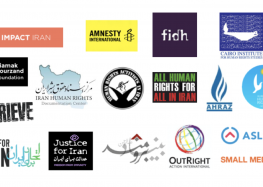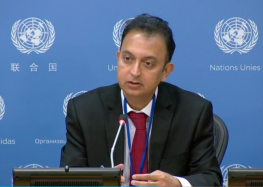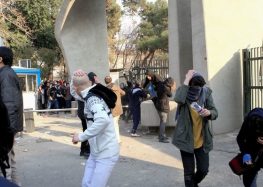Strong UN Support for Iran Special Rapporteur Shown as His Mandate is Renewed

Human Rights Council session.
22 to 5 vote shows ongoing cross-regional concern for human rights in Iran
Iran desperately tries to give the appearance it is cooperating with the UN
(22 March 2012) The International Campaign for Human Rights in Iran today welcomed the Human Rights Council’s 22 to 5 vote extending the mandate of the Special Rapporteur on the situation of human rights in the Islamic Republic of Iran for another year.
Facing the international community’s resolve to address the country’s human rights crisis, Iranian authorities should begin cooperating with Special Rapporteur Ahmed Shaheed and allow him unhampered access to the country, the Campaign added.
“This Special Rapporteur’s work shines a light on the experiences of so many ordinary Iranian people who have been deprived of their most fundamental rights,” said Hadi Ghaemi, spokesperson for the Campaign.
“Whether it is activists and human rights defenders in prison or minorities and women facing discrimination, the Human Rights Council is providing a way for their voices to he heard.”
Today’s vote showed strong cross-regional support with 22 Yes votes from countries including Peru, Botswana, Chile, Senegal, Maldives, the Czech Republic, Benin, Romania, Mexico, Hungary, Costa Rica, Poland and Guatemala. Mauritania changed from a No vote last year to Yes. Ecuador changed from a No vote last year to an abstention. While Ecuador and Uruguay abstained, citing hesitations about country-specific resolutions, they still made strong statements expressing concern for human rights violation in Iran and calling on the government to impose a moratorium on the death penalty. Over 47 UN member states co-sponsored the resolution.
Many countries that voted Yes or abstained expressed concern for the declining situation of human rights in Iran last week during a session about the Special Rapporteur’s most recent report. In response to Iran’s ongoing failure to cooperate with UN mechanisms, the Human Rights Council adopted and renewed the mandate.
“Through the Special Rapporteur, the Human Rights Council is providing Iran with an opportunity to engage meaningfully with the UN system so it can reverse course away from the current path of skyrocketing executions and illegal detentions, widespread torture, unfair trials, censorship, and deepening discrimination,” said Ghaemi.
“Whether or not Iranian officials take advantage of this opportunity is up to them, but at least they know the world is watching and they can’t continue down this path without being held accountable,” he added.
Recently, Iran has been trying to give the appearance of cooperation with the UN. In an attempt, in part, to preempt today’s vote and weaken support for the mandate’s renewal, Iran announced last week and again just prior to the vote that it would allow two thematic mandate holders to visit the country this year. Thematic mandate holders are experts charged with monitoring specific human rights categories, such as torture, execution, or freedom of religion. Iran has not allowed a visit from a thematic mandate holder since 2005.
“Iran is desperately trying to do whatever it can to look cooperative with the UN while at the same time avoiding cooperation with the country-specific Rapporteur who is best positioned to evaluate and draw attention to human rights abuses in Iran and urge meaningful improvements,” said Ghaemi. “It’s not up to Iran to decide which UN mechanisms to cooperate with and which it should ignore. Real cooperation means working with the Iran Rapporteur. Inviting thematic mandate holders is little more than a ploy to avoid true cooperation with the country mandate, and UN member states should not be fooled.”
Iranian authorities employed similar tactics last year just before the Human Rights Council voted to create the country-specific mandate by indicating it would welcome a visit by the High Commissioner of Human Rights to visit the country, after having postponed such a visit for several years. Nonetheless, the Human Rights Council established the Special Rapporteur and the High Commissioner, Navi Pillay, chose not to visit the country. Instead, she sent a working-level delegation from her office to evaluate whether Iran was willing to facilitate a meaningful country visit.
Iranian authorities, however, refused the working-level delegation’s requests for meetings with opposition figures under house arrest, access to other prisoners of concern, and a meeting with a range of independent civil society representatives, according to a report by the Secretary General released yesterday. The Secretary General reported that “more in depth preparation and outreach to different actors in Iran” would be needed before the High Commissioner herself could go.
Today’s renewal of the Special Rapporteur’s mandate intensifies international pressure on Iran to address its human rights violations and begin meaningful cooperation with UN mechanisms. Since the creation of the mandate, the Special Rapporteur has released two in-depth reports which, together with two Secretary General reports, a General Assembly resolution on the situation of human rights in Iran, and a review of Iran’s compliance with the ICCPR by the Human Rights Committee, found a “striking pattern” of systematic violations of civil and political rights in Iran.
Ahead of the vote today, the Iranian representative called the resolution politically motivated. However, as the Special Rapporteur Ahmed Shaheed has repeatedly noted, the Iranian government’s cooperation with him can only lessen the potential for politicization.






